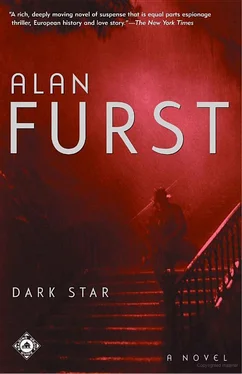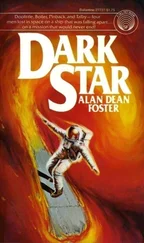Alan Furst - Dark Star
Здесь есть возможность читать онлайн «Alan Furst - Dark Star» весь текст электронной книги совершенно бесплатно (целиком полную версию без сокращений). В некоторых случаях можно слушать аудио, скачать через торрент в формате fb2 и присутствует краткое содержание. Жанр: Шпионский детектив, на английском языке. Описание произведения, (предисловие) а так же отзывы посетителей доступны на портале библиотеки ЛибКат.
- Название:Dark Star
- Автор:
- Жанр:
- Год:неизвестен
- ISBN:нет данных
- Рейтинг книги:3 / 5. Голосов: 1
-
Избранное:Добавить в избранное
- Отзывы:
-
Ваша оценка:
- 60
- 1
- 2
- 3
- 4
- 5
Dark Star: краткое содержание, описание и аннотация
Предлагаем к чтению аннотацию, описание, краткое содержание или предисловие (зависит от того, что написал сам автор книги «Dark Star»). Если вы не нашли необходимую информацию о книге — напишите в комментариях, мы постараемся отыскать её.
Dark Star — читать онлайн бесплатно полную книгу (весь текст) целиком
Ниже представлен текст книги, разбитый по страницам. Система сохранения места последней прочитанной страницы, позволяет с удобством читать онлайн бесплатно книгу «Dark Star», без необходимости каждый раз заново искать на чём Вы остановились. Поставьте закладку, и сможете в любой момент перейти на страницу, на которой закончили чтение.
Интервал:
Закладка:
He woke to a day of light snow and subtle terror in Prague. He saw nothing, felt everything. On the fifth of November, Hitler had made a speech once again declaring the urgency, for Germany, of Lebensraum, the acquisition of new territory for German growth and expansion, literally “room to live.” Like an operatic tenor, singing counterpoint to Hitler’s bass, Henlein, the leader of the Sudeten Germans, pleaded publicly in an open letter carried by Czech newspapers the following day for a halt to Czech “persecution” of German minorities in the Sudetenland, the area bordering southern Germany. On 12 November the countertenor, Reich Interior Minister Wilhelm Frick, said on the radio: “Race and nationality, blood and soil, are the principles of National Socialist thought, we would be acting in contradiction if we attempted to assimilate a foreign nationality by force.”
This may have sounded warm and comforting in France, but the Sudeten Germans were not a foreign nationality, and neither were the Austrians-not according to German diplomatic definitions. Sudeten German representatives next staged a mass exodus from parliament, informing reporters waiting outside that they had been physically abused by Czech police.
Everybody in Prague knew this game-incidents, provocations, speeches-it meant that the German tank divisions sitting up on the border were coming down. Today? Tomorrow? When?
Soon.
On the surface, there was nothing to see. But what they felt here made itself known in subtle ways: the way people looked at each other, a note in a voice, the unfinished sentence. Szara took the receipt he’d been given in Ostend to the central railroad station. The baggagemaster shook his head, this was from a smaller station, and gestured toward the edge of the city.
He took a taxi, but by the time he arrived, the baggage room of the outlying station was closed for lunch. He found himself in a strange, silent neighborhood with signs in Polish and Ukrainian, boarded windows, groups of tieless men with buttoned collars gathered on street corners. He walked along empty streets swept by wind-driven swirls of dust. The women were hidden in black shawls, children held hands and kept close to the buildings. He heard a bell, looked down a steep lane, and saw a Jewish peddler with a slumped, starved horse, plumes of breath streaming from its nostrils as it attempted to pull a cart up a hill.
Szara found a tiny cafe; conversation stopped when he walked in. He drank a cup of tea. There was no sugar. He could hear a clock ticking behind a curtained doorway. What was it in this place? A demon lived here. Szara struggled to breathe, his persona flowed away like mist and left a dull and anxious man sitting at a table. The clock behind the curtain chimed three and he walked quickly to the station. The baggagemaster limped painfully and wore a blue railroad uniform with a war medal pinned on the lapel. He took the receipt silently and, after a moment of study, nodded to himself. He disappeared for a long time, then returned with a leather satchel. Szara asked if a taxi could be called. “No,” the man said. Szara waited for more, for an explanation, something, but that was it. No.
So he walked. For miles, through zigzag streets clogged with Saturday life, where every ancient stone leaned or sagged; past crowds of Orthodox Jews in caftans and curling sidelocks, gossiping in front of tiny synagogues; past Czech housewives in their print dresses, carrying home black breads and garlic sausages from the street markets; past children and dogs playing soccer on the cobblestones and old men who leaned their elbows on the windowsills and smoked their pipes and stared at the life in the street below. It was every quarter in every city in Europe in the cold, smoky days of November, but to Szara it was like being trapped in the dream where some terrifying thing was happening but the world ignored it and went blindly about its business.
Reaching the hotel, he trudged upstairs and hurled the satchel onto the bed. Then he collapsed in a chair and closed his eyes in order to concentrate. Certain instincts flared to life: he must write about what he’d felt, must describe the haunting of this place. Done well, he knew, such stories spread, took on a life of their own. The politicians would do what they did, but the readers, the people, would understand, care, be animated by pity to speak out for the Czech republic. How to do it? What to select? Which fact really spoke, so that the writer could step aside and allow the story to tell itself. And if his own dispatch did not appear in other countries, it most certainly would run in the Communist party press, in many languages, and more foreign journalists than cared to admit it had a glance at such newspapers. Editorial policy said anything to keep the peace, but let the correspondents come here and see it for themselves.
Then the satchel reminded him of its presence. He examined it and realized he’d never seen one like it: the leather was dense, pebbled, the hide of a powerful, unknown animal. It was covered with a thick, fine dust, so he wet his index finger and drew a line through it, revealing a color that had once been that of bitter chocolate but was now faded by sun and time. Next he saw that the seams were hand-sewn; fine, sturdy work using a thread he suspected was also handmade. The satchel was of the portmanteau style-like a doctor’s bag, the two sides opened evenly and were held together by a brass lock. Using a damp towel, he cleaned the lock and found a reddish tracery etched into the metal surface. This was vaguely familiar. Where had he seen it? In a moment it came to him: such work adorned brass bowls and vases made in western and central Asia-India, Afghanistan, Turkestan. He tried to depress the lever on the underside of the device, but it was locked.
The handgrip bore half a tag, tied on with string. Peering closely, he was able to make out the date the satchel had been deposited as left luggage: 8 February 1935. He swore softly with amazement. Almost three years.
He put one finger on the lock. It was ingenious, a perfectly circular opening that did not suggest the shape of its key. He probed gently with a match, it seemed to want a round shaft with squared ridges at the very end. Hopefully, he jiggled the match about but of course nothing happened. From another time the locksmith, perhaps an artisan who sat cross-legged in a market stall in some souk, laughed at him. The device he’d fashioned would not yield to a wooden match.
Szara went downstairs to the hotel desk and explained to the young clerk on duty: a lost key, a satchel that couldn’t be opened, important papers for a meeting on Monday, what could be done? The clerk nodded sympathetically and spoke soothingly. Not to worry. This happens here every day. A boy was sent off and returned an hour later with a locksmith in tow. In the room the locksmith, a serious man who spoke German and wore a stiff, formal suit, cleared his throat politely. One didn’t see this sort of mechanism. But Szara was too impatient to make up answers to unasked questions and simply urged the man to proceed. After a few minutes of meditation, the locksmith reluctantly folded up his leather tool case, put it away, and, reddening slightly, drew a set of finely made burglar’s picks from the interior pocket of his jacket. Now the battle between the two technicians commenced.
Not that the Tadzik, the Kirghiz, the craftsman of the Bokhara market-whoever he’d been-didn’t resist, he did, but in the event he was no match for the modern Czech and his shining steel picks. With the emphatic snick of the truly well made device the lock opened, and the locksmith stood back and applied an immaculate gray cloth to his sweaty forehead. “So beautiful a work,” he said, mostly to himself.
Читать дальшеИнтервал:
Закладка:
Похожие книги на «Dark Star»
Представляем Вашему вниманию похожие книги на «Dark Star» списком для выбора. Мы отобрали схожую по названию и смыслу литературу в надежде предоставить читателям больше вариантов отыскать новые, интересные, ещё непрочитанные произведения.
Обсуждение, отзывы о книге «Dark Star» и просто собственные мнения читателей. Оставьте ваши комментарии, напишите, что Вы думаете о произведении, его смысле или главных героях. Укажите что конкретно понравилось, а что нет, и почему Вы так считаете.












